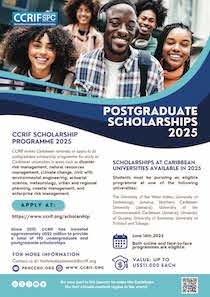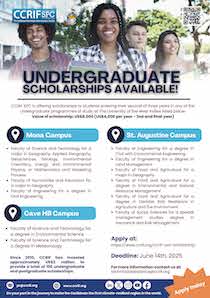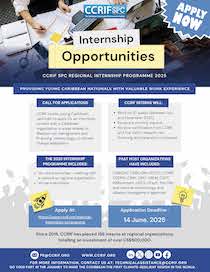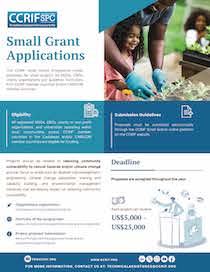October 15th, 2020
The Continuing and Professional Education (CPE) Certificate course in Fundamentals of Disaster Risk Financing for Advancing Sustainable Development of Small Island Developing States (SIDS) will be delivered for the first time commencing Tuesday, November 3rd, 2020. This 40-contact-hour training initiative was established under an MOU between CCRIF SPC and The University of the West Indies.
The course focuses in large measure on enhancing the understanding and use of the tools used in disaster risk financing and the important role these tools play in advancing debt and fiscal sustainability of countries; the course also explores the rationale for countries to have in place disaster risk financing policies and strategies and how these can be developed to complement countries’ comprehensive disaster risk management policies. It also introduces CCRIF SPC as the Caribbean region’s main disaster risk financing facility for parametric insurance and how parametric insurance and the models underpinning it work. Additionally, it examines the range of other ex-ante and ex-post disaster risk financing instruments and how these work alongside each other. The linkages between shock responsive social protection and disaster risk financing within the context of vulnerable populations is also explored.
It comprises five units: The Caribbean’s Natural Hazard Landscape and Profile; Introduction to Disaster Risk Financing; Introduction of Integrated Risk Management and All Hazards Risk Policy Frameworks; Parametric Insurance and Modelling; and Shock Responsive Social Protection and DRM and Insurance. Facilitators of the course will include lecturers at The UWI and members of the CCRIF team.
This course targets individuals with an interest in disaster risk management (DRM) and areas of public financial management, including professionals with responsibility for finance/economic development, disaster management, meteorology, water resource management, environmental management, physical planning, and sustainable development.
Successful participants will be awarded a UWI Open Campus Certificate of Achievement with four Continuing Education Units or CEUs. This is an internationally recognized system of merit for persons pursuing Continuing & Professional Education offerings.
CCRIF SPC is providing scholarships to cover the fees for enrolment in this course. For more information and to apply for this course and a scholarship, please visit:
https://open.uwi.edu/programmes/fundamentals-disaster-risk-financing-advancing-sustainable-development-small-island
About CCRIF SPC
CCRIF SPC is a segregated portfolio company, owned, operated and registered in the Caribbean. It limits the financial impact of catastrophic hurricanes, earthquakes and excess rainfall events to Caribbean and Central American governments by quickly providing short-term liquidity when a parametric insurance policy is triggered. It is the world’s first regional fund utilizing parametric insurance, giving member governments the unique opportunity to purchase catastrophe coverage with lowest-possible pricing. CCRIF SPC offers five parametric insurance products: for tropical cyclones, earthquakes, excess rainfall, the fisheries sector, and electric utilities. CCRIF SPC has 22 government members – 19 in the Caribbean and 3 in Central America – and one electric utility member. CCRIF was developed under the technical leadership of the World Bank and with a grant from the Government of Japan. It was capitalized through contributions to a Multi-Donor Trust Fund (MDTF) by the Government of Canada, the European Union, the World Bank, the governments of the UK and France, the Caribbean Development Bank and the governments of Ireland and Bermuda, as well as through membership fees paid by participating governments. In 2014, an MDTF was established by the World Bank to support the development of CCRIF SPC’s new products for current and potential members and facilitate the entry for Central American countries and additional Caribbean countries. The MDTF currently channels funds from various donors, including: Canada, through Global Affairs Canada; the United States, through the Department of the Treasury; the European Union, through the European Commission, and Germany, through the Federal Ministry for Economic Cooperation and Development and KfW. Additional financing has been provided by the Caribbean Development Bank, with resources provided by Mexico; the Government of Ireland; and the European Union through its Regional Resilience Building Facility managed by the Global Facility for Disaster Reduction and Recovery (GFDRR) and The World Bank.
About The UWI
For over 70 years The University of the West Indies (The UWI) has provided service and leadership to the Caribbean region and wider world. The UWI has evolved from a university college of London in Jamaica with 33 medical students in 1948 to an internationally respected, regional university with near 50,000 students and five campuses: Mona in Jamaica, St. Augustine in Trinidad and Tobago, Cave Hill in Barbados, Five Islands in Antigua and Barbuda and an Open Campus. As part of its robust globalization agenda, The UWI has established partnering centres with universities in North America, Latin America, Asia, Africa and Europe including the State University of New York (SUNY)-UWI Center for Leadership and Sustainable Development; the Canada-Caribbean Institute with Brock University; the Strategic Alliance for Hemispheric Development with Universidad de los Andes (UNIANDES); The UWI-China Institute of Information Technology, the University of Lagos (UNILAG)-UWI Institute of African and Diaspora Studies; the Institute for Global African Affairs with the University of Johannesburg (UJ); The UWI-University of Havana Centre for Sustainable Development; The UWI-Coventry Institute for Industry-Academic Partnership with the University of Coventry and the Glasgow-Caribbean Centre for Development Research with the University of Glasgow.
The UWI offers over 800 certificate, diploma, undergraduate and postgraduate degree options in Food & Agriculture, Engineering, Humanities & Education, Law, Medical Sciences, Science & Technology, Social Sciences and Sport.
As the region’s premier research academy, The UWI’s foremost objective is driving the growth and development of the regional economy. The world’s most reputable ranking agency, Times Higher Education, has ranked The UWI among the top 600 universities in the world for 2019 and 2020, and the 40 best universities in Latin America and the Caribbean in 2018 and 2019, then top 20 in 2020. The UWI has been the only Caribbean-based university to make the prestigious lists. For more, visit www.uwi.edu.
(Please note that the proper name of the university is The University of the West Indies, inclusive of the “The”,) hence The UWI.)





